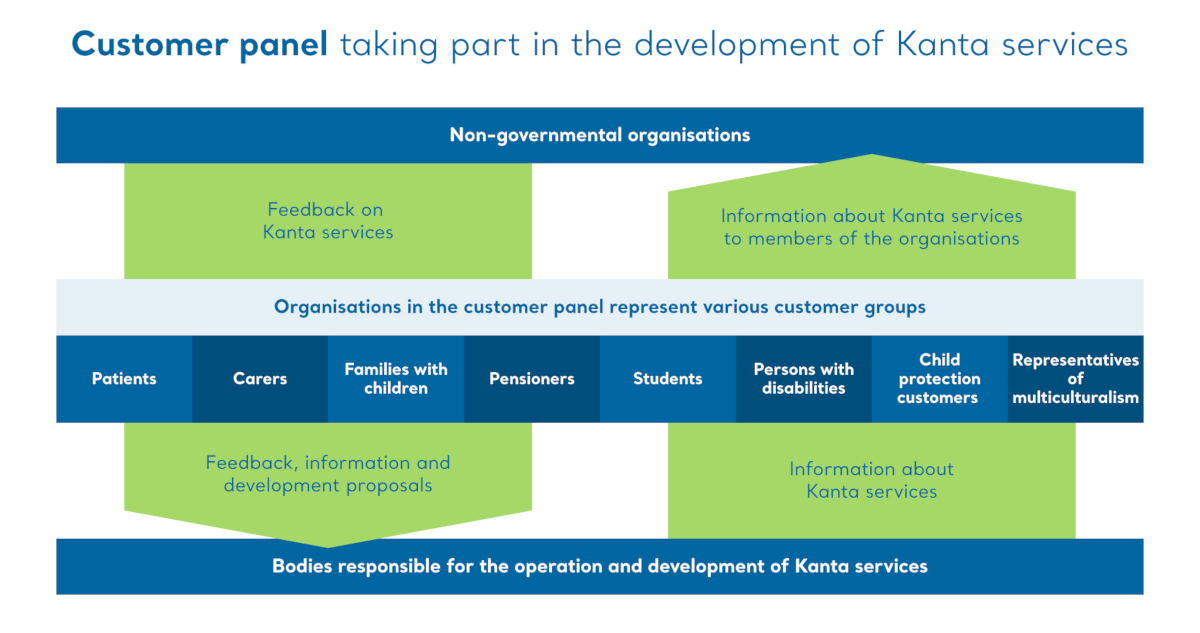Customer panel taking part in the development of Kanta Services
We want to include citizens in the operation and development the Kanta Services in as diverse a way as possible. This is implemented, for example, through customer surveys, usability testing, and piloting. Citizens also give plenty of development proposals and feedback through Kela’s customer support. In addition, a customer panel has also been set up for the Kanta Services, with members representing various non-governmental organisations.
“The customers of Kanta Services are all people living in Finland, and therefore the members of the customer panel aim to represent a wide range of customer groups. Currently, the organisations taking part in the panel represent patients, carers, families with children, pensioners, students, persons with disabilities, and child protection customers, and we also have a representative from an organisation supporting multiculturalism,” says Sari Ahonen, Customer Relations Manager for My Kanta Pages and head of the customer panel.

The customer panel for Kanta Services has been in operation since 2015. Among the original members of the panel is Suomen Potilasliitto (Finnish Patients’ Association), which has a long history of promoting the interests and rights of patients. Chairman of the association, Paavo Koistinen, sees that the best way to develop Kanta Services is through interaction.
“Those responsible for the operation and development of Kanta Services receive information through the customer panel with regard to the different operating environments where citizens use the services and the different questions they may have, for example, in relation to My Kanta Pages. We at the Finnish Patients’ Association want to be involved by bringing the patient’s point of view across.”
Mutual exchange of messages
The customer panel convenes twice a year, but the members communicate actively with one another also between the meetings. The topics to discuss may include, for example, the current situation and future outlook of the Kanta Services, development of customer communications and guidelines on the basis of customers' needs, and changes in legislation.
“Representatives of the non-governmental organisations will bring forward customer feedback, and many of them also actively put forward development proposals. It is also possible to request comments from the members of the panel on various texts or websites in their planning stage,” Sari Ahonen says.
The Finnish Patients’ Association has three members and one deputy member in the customer panel, and they also represent various member organisations of the Finnish Patients’ Association. That way a wide range of various patients’ voices will be heard directly.
“Other channels include training events, seminars and peer support meetings organised by the association. Kanta Services are also discussed in these events, and the feedback will be taken forward. The Finnish Patients’ Association has highlighted themes, such as patient safety and safeguarding the availability of services for the ageing population in view of the increased digitalisation of the healthcare services,” Koistinen explains.
The significance of the customer panel is also reciprocal: the organisations not only provide information and feedback, but they also pass the message about Kanta Services on to their own members. The clarity of printed communications on the Kanta Services has also been improved on the basis of comments received from the members of the customer panel.
“Kela has a great responsibility for communications, but I would also make non-governmental organisations responsible for this task when they have available channels towards the customers and members. One of the tasks of the organisations is to pass this message on,” Koistinen points out.
Kanta Services are developed wherever possible
The Finnish Patients’ Association finds the activities of the customer panel very useful.
“We receive first-hand information about the priorities in the development of Kanta Services. Cooperation between various organisations is also extremely constructive. Kela’s open and receptive attitude towards development proposals has been a really positive issue from the customer’s and patient’s point of view,” Koistinen sums up.
Citizens put forward many kinds of wishes and proposals concerning the contents of Kanta Services through the customer panel and other channels. All citizens’ development proposals are processed in the development groups responsible for the services. The needs concerning the services are promoted where possible, but the restrictions of legislation must always be taken into account in the development of services.
“For example, we receive a lot of requests about showing information in My Kanta Pages. However, it is not possible to implement everything: we cannot reveal, say, who has accessed medical records. The law does not allow showing this information on an individual basis, only the organisation that has accessed the data,” Ahonen emphasises.